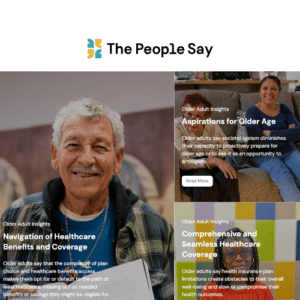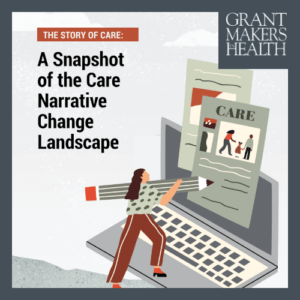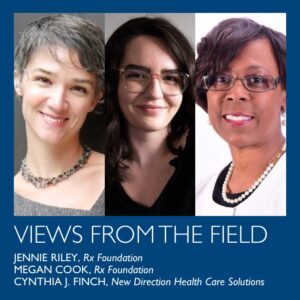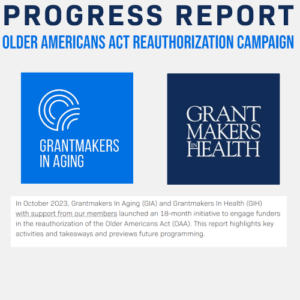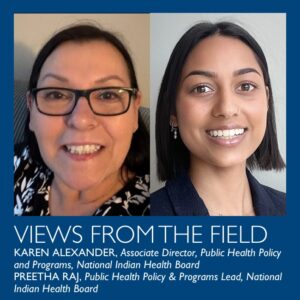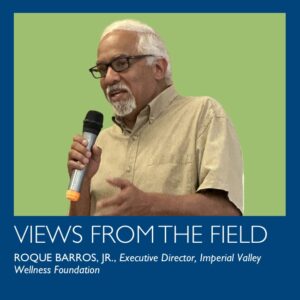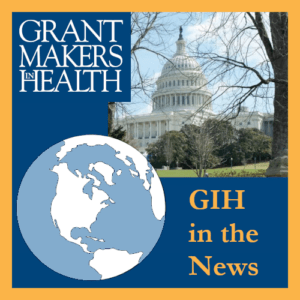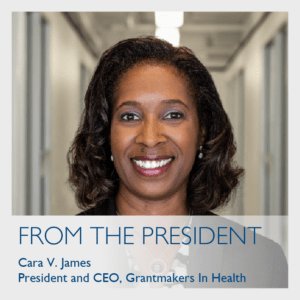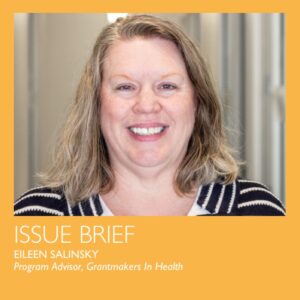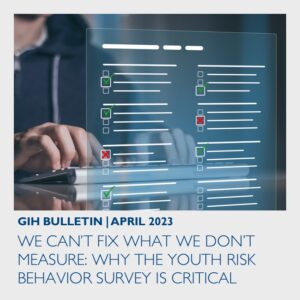Featured Resources
The People Say: A New Older Adult and Caregiver Policy and Research Tool
An online research hub features first-hand insights from older adults and caregivers on the issues most important to them, as well as feedback from experts on policies affecting older adults. The project particularly focuses on the experiences of communities often under-consulted in policymaking, including older adults of color, those who are low income, and/or those who live in rural areas where healthcare isn’t easily accessible.
The Story of Care: A Snapshot of the Care Narrative Change Landscape
At some point, every one of us will need care or need to provide care. The COVID-19 pandemic put a spotlight on the extraordinary contributions of caregivers and exposed the failings caused by our nation’s lack of care policies, especially for communities of color. Deploying narrative-change strategies across care-related issues will help create the conditions for cultural and policy progress. The goal of this report is to share with funders the promising narrative-change strategies and tactics that have been identified, a directory of funders and grantees who are supporting this work, and how philanthropy can best support this effort.
GIH Advocacy for the Reauthorization of the Older Americans Act (OAA)
The OAA provides critical services that address the social drivers of health for older adults. Grantmakers In Health (GIH) and Grantmakers In Aging (GIA) are partnering to engage funders in advancing the reauthorization of this important piece of legislation.
Explore Population Health Topics
Latest Resources
Statement from Cara V. James in Philanthropy Women About Consequences of New Administration’s Actions
A statement from Grantmakers In Health (GIH) President and CEO Cara V. James was republished in an article in Philanthropy Women on May 15, 2025, titled “Health Care Donors Urged to Take a Stand Amidst Ongoing Funding Cuts.” The statement was originally published by GIH to mark the first 100 days of the new administration, denouncing the harmful policies, devastating funding cuts, and threats to democracy that have taken place in that time. The editor included an editor’s note that Dr. James’ statement struck a deep chord and urged funders to step up to mitigate the damage of the administration’s extreme and unprecedented withdrawal of funding for health.
Maternal Health in American Indian/Alaska Native Communities: Challenges, Opportunities, and Pathways Forward
Maternal health is a cornerstone of any community’s well-being, yet American Indian and Alaska Native (AI/AN) women face disproportionate challenges in achieving safe and healthy pregnancies. Historical inequities, systemic barriers, and the enduring effects of colonization have resulted in significant maternal health disparities within Native communities. However, these same communities are also sources of resilience, creativity, and innovation. Maternal health programs aimed at centering community in tradition, culture, and resiliency can offer unique, cross-sectoral solutions to complex systemic health barriers for AI/AN families.
Supporting Southern California Wildfire Recovery Efforts
Grantmakers In Health (GIH) is watching with the rest of the country as Southern California continues to battle wildfires devastating communities in and around the Los Angeles metropolitan area. Our thoughts are with the many thousands of people who have been displaced from their homes and seen their neighborhoods and towns destroyed. There is much that philanthropy can do to augment local, state, and federal government recovery efforts. Find out how you can help engage your organization’s support.
Publications and Reports
Public Health Approaches to Firearm Violence Prevention
Firearm injuries are a serious public health problem, killing more than 47,000 Americans each year and becoming the leading cause of death for children and teens in the United States in 2020. Given the impact and complexity of this health crisis, Grantmakers in Health (GIH) hosted a first-ever preconference session focused on firearm violence in advance of the June 2023 GIH Annual Conference on Health Philanthropy. Session speakers briefed partners on the causes of gun violence and provided an opportunity for health funders to learn more about potential solutions through a public health lens. This Issue Brief provides highlights of the meeting’s proceedings and previews GIH’s plans to convene a funder learning collaborative on firearm violence prevention to continue the peer learning and sharing that began at the preconference session.
The Story of Care: A Snapshot of the Care Narrative Change Landscape
At some point, every one of us will need care or need to provide care. The COVID-19 pandemic put a spotlight on the extraordinary contributions of caregivers and exposed the failings caused by our nation’s lack of care policies, especially for communities of color. Deploying narrative-change strategies across care-related issues will help create the conditions for cultural and policy progress. The goal of this report is to share with funders the promising narrative-change strategies and tactics that have been identified, a directory of funders and grantees who are supporting this work, and how philanthropy can best support this effort.
GIH Bulletin: April 2023
In 2021, 1 in 6 high school students was electronically bullied or bullied at school. That same year, 22 percent of high school students, and 45 percent of students who identified as LGBTQ+, seriously considered attempting suicide. We know this information because of the Youth Risk Behavior Survey, which along with other state and local surveys, comprises the Youth Risk Behavior Surveillance System.
Connect With Funder Peers on Population Health
Interested in exchanging strategies, information, and questions with your funder peers? Sign up for GIH E-Forums.


